Different Environment
I ate one last big hotel breakfast, said goodbye to my parents. I clipped in and pedaled south, like I had done every day before their visit. Back to business.
I had planned on only getting as far as Kenedy, but after getting there at 12:30 PM, I decided to push on the extra 50 km to make it to Beeville. The headwind wasn't as bad as predicted. The roads were incredibly flat. And it had even stayed cloudy all morning, making it comfortable outside!
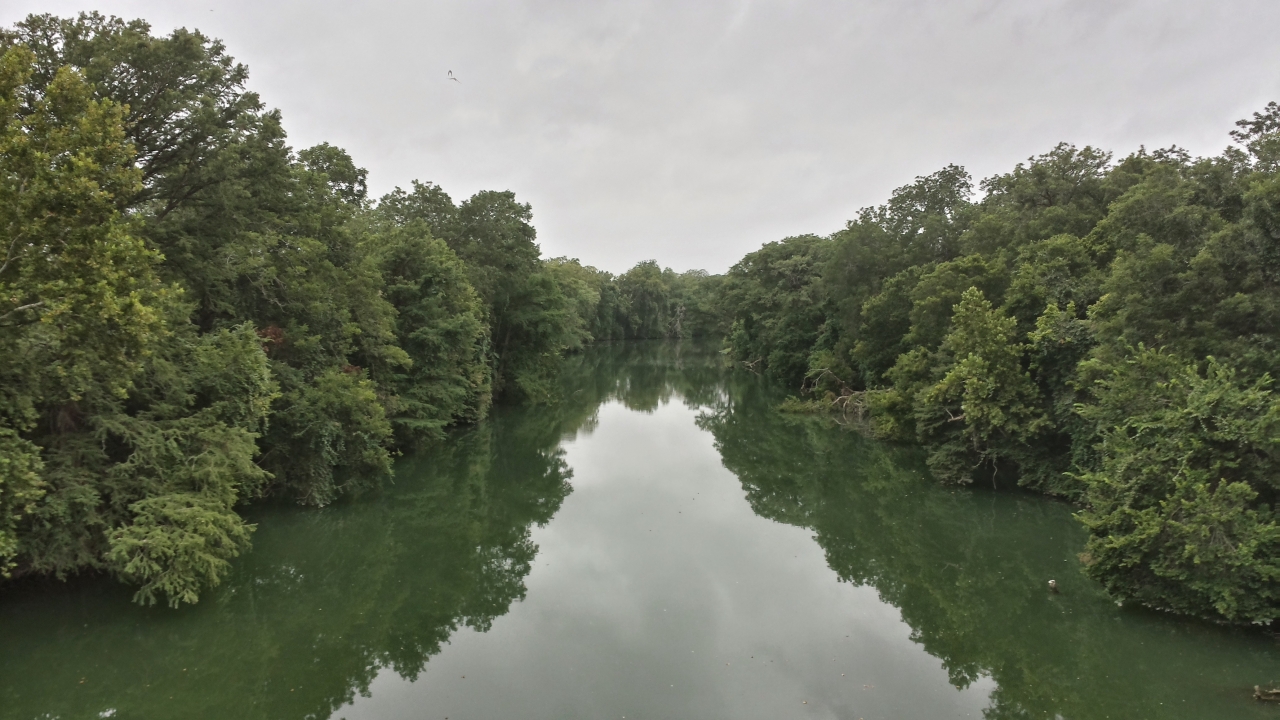
During those last 50 km, the clouds parted and the sun shone down at full strength, igniting the pavement so I got the smell of hot tar as I rode. Now on the coastal plains, my goodness, the humidity! So far I'd only had to deal with scorching heat, but now I get the sweltering kind.
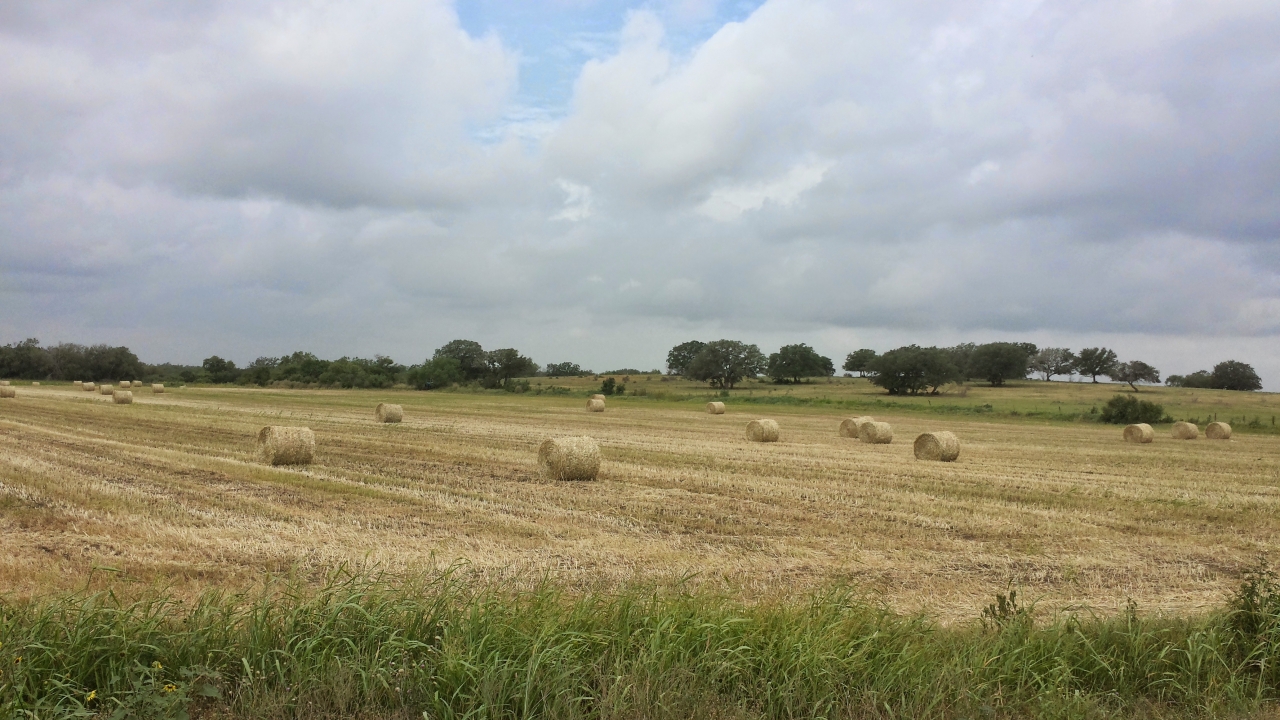
I found a large church in Beeville and asked for a floor and a ceiling. Pastors Jessie and Steve put me up in a hotel instead, and even gave me some money for dinner! After a long (150 km), hot, humid day, that was more than a treat!
But be careful what you wish for, because the next day, instead of heat and sunshine, I got rain. All day. I saw lightning and heard thunder a few times, but I never counted less than 20 seconds between them, so I felt safe. And it was never a downpour, only solid, steady rain, all day. I would learn later that in Central Texas, where I had been only two days before, they got a whole lot more rain and had all kinds of flooding. So I guess I was lucky. And since it was a warm Texas summer shower, putting on a rain jacket wasn’t necessary.
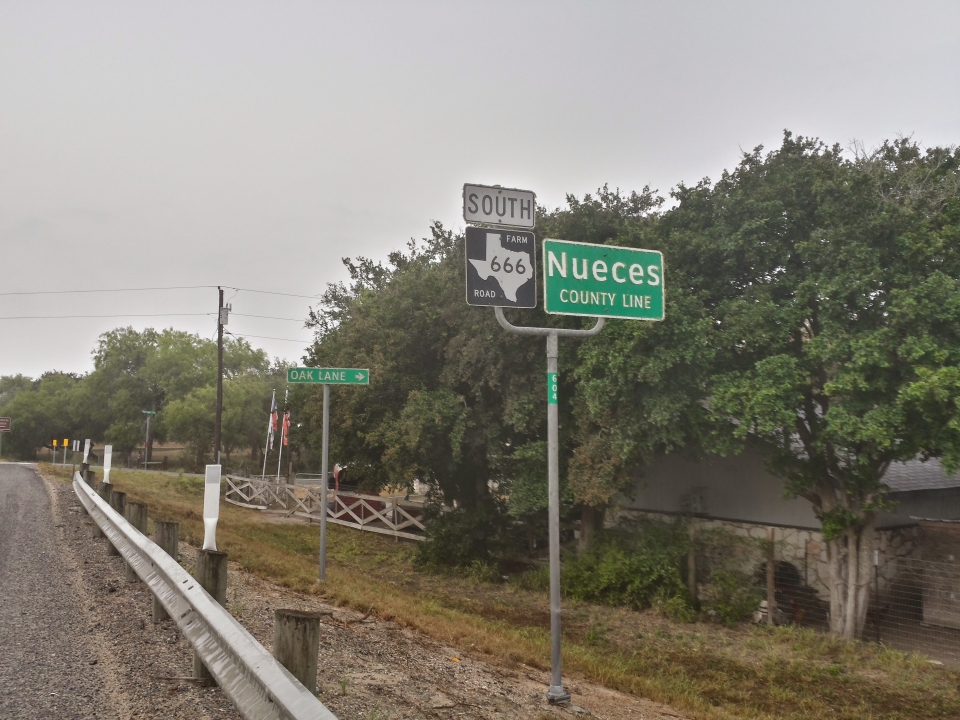
I made good time to Kingsville, in part because on rainy days, there's little incentive to pull over and take a break. It was only about 2:00 in the afternoon on a Friday, presumably plenty early before people go home for the day.
Five large churches in a row and no one there. All of them were locked. Three of them had a courtyard with a heavily chained-up gate. Strange that churches would go to such lengths to keep people from visiting. Maybe they have a theft problem in this town?
I decided to try a different approach and went to the university to see if they could help me in some way. They sent me to the university police, who sent me to the fire station, who sent me to the city police. And there, for the first time today, someone appeared like they were happy to see me.
The receptionist got a hold of Chaplain Jose Rodriguez, who like Jessie and Steve the night before, put me in a hotel room! Neither one was anything fancy, but man, what luxury I've been treated to lately! I hope I don't get spoiled...
I set off for Harlingen with a slightly-higher-than-normal spirit in the morning. I'd pass through Raymondville today, my last mail drop in the United States! Part of the reason I'd pushed extra hard in the last two days was to shave a day off and arrive on Saturday instead of Sunday, when the post office would be closed. In effect, I was saving two days for the price of one.
The headwind was inexplicably gone on a morning it was predicted to be stronger. The pavement was good, a rarity in Texas! There were no hills whatsoever; a later look at my GPS data would reveal that my highest elevation all day was 18 meters. I left Valeria in the same gear all morning and ate up the distance.
At one point, I realized I might get to Raymondville, 115 km from the start of the day, before noon!
Raymondville by noon...something about that stuck out for some reason...wait, don't post offices close at noon on Saturdays?
OHHHHH CRAAAAAAAAP!!!!!
If I didn't make it to Raymondville before the post office closed today, I'd have to wait in that town two days just to pick up a package!
I would've tried to haul my behind to Raymondville, but there were still 60 km to go! I left Valeria in a reasonably high gear and tried to increase my cadence only a touch, taking myself out of my comfort zone without doing anything I couldn't continue for a few hours at a time. I took absolutely no breaks until I got to Raymondville.
I was entering a part of Texas I'd never seen before, the Rio Grande Valley. I’d been to the beach in Galveston a handful of times, and Corpus Christi twice, but never farther south than that. Texas just keeps on going!
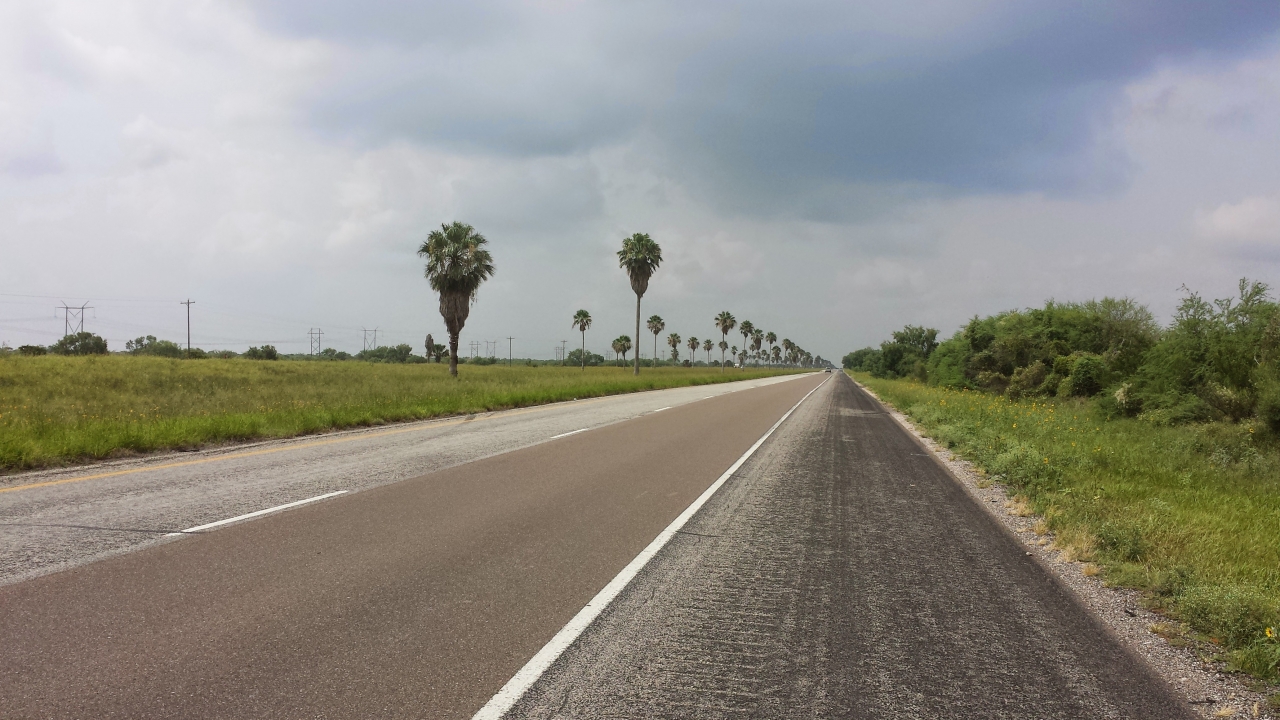
If you ever wonder why your friends in Texas have never in their life taken a weekend trip to South Padre Island, that's because it's five hours from San Antonio, six hours from Austin, eight hours from Houston, and ten hours from Dallas. And if you have the same question about Big Bend, that's because it's six hours from El Paso, which itself is at least a day from, well, anywhere.
Montana took four days to cross. Wyoming took six, and only because I backtracked an entire day. Colorado took four. None of those are small states.
It's been two weeks now and I'm still in Texas.
Yep, Texas is big.
The ground vegetation is growing thicker and greener, and instead of mesquites and live oaks, I keep seeing palm trees! In Texas alone, I've moved from the high plains to the rugged canyonlands to the blackland prairie to the hill country to the coastal plains, and now it's tropical! And I didn't even go to the east or west parts of the state, where there are even more diverse landscapes! I think there are a lot of Texans that don't realize their state looks like this.
10 km from Raymondville, it was barely past 11:00 AM. I got this in the bag. Just then, the road quality deteriorated and a headwind picked up, strong, all at once.
It can never be easy, can it?
I forced my way into Raymondville and made it to the post office at 11:45 AM. They closed at 11:30.
Oh, come on!!!
In semi-desperation, I knocked on the closed door. A helpful man named Thomas opened it and was glad to hand me my mail: a single envelope. I knew there should’ve been a package. It was late. I would either have to wait in this town until Monday, have it forwarded ahead, or have it returned to sender.
I only liked the middle option, but I would be in Mexico in only a few days. The only way forwarding could work is if I took a day off somewhere in the next few days.
Wait, I'm going to South Padre Island soon. Yeah, that could work. In fact, I like the sound of that.
In the envelope was a check from Cathy and Jim, a couple I had met in British Columbia about five weeks ago. They had already made a sizable donation to World Bicycle Relief online. Thanks, guys!
Once again, the sun came out in the afternoon. The coastal plains are already known for their humidity, but after all the rain yesterday, my goodness! It only got to the low 30s C (low 90s F), but felt like so much more. For the next month or more, I will have to accept this.
I went to the visitors center in Harlingen, a mid-sized town, big enough that riding all over it to ask for a place to stay would be an ordeal. They recommended a place called Loaves and Fishes, something they merely explained as being run by a church.
Not far away, I made it there in ten minutes, if that. The doors were locked. A few people were sitting outside in the shade, smoking a cigarette.
"Is it open?"
"Not until six. Or four, if you want dinner. You're looking for the homeless shelter?"
As it turns out, they provide dinner at 4:00 PM, then make everyone leave, then come back in through a different door at 6:00 to check in for the night. Weird system, but I won't question it if I get a meal and a warm place to sleep.
As you might guess, I've never stayed in a homeless shelter before, and I guess that meant I had a preconceived notion of what they're like. I imagined it would primarily be inhabited by the stereotypical unbalanced homeless guy, the one that shouts at imaginary people and spends his last dollar on cheap booze. And those people exist, I've seen them, and maybe you have too.
But it would appear that the silent majority of the homeless and needy are quiet, dignified people. The working poor. People who used to have low-paying jobs and don't anymore. People with a permanent disability that prevents them from working blue collar, the only thing they're qualified for. People who have a minimum-wage job, but can't make enough to crank out the rent, not even in a low cost of living town like Harlingen.
There was Roy, who had a stroke three weeks ago and can barely walk even with his walker, and can't at all without it. There was Biker Joe, who used to work on classic cars and is running a custom low-rider bike shop with his cousin, with dreams of getting the equipment to do machine tubing and welding next year. There was Derrick, a healthy young man (younger than me) who had a broker's license, can't find any work blue collar or otherwise, and was hoping to find a work-for-stay program while he trained to join the Marines.
"I'm tired, Rob," the usually silent Roy disclosed when we were alone for a minute. "Every day I wanna just give up. But the doctor says the more I walk with this," he put his hand on his walker, "the closer I get to walking without it. But I don't know. I don't know if I ever will."
Roy later told me that if someone touched Valeria, he'd get up and run after them.
Everyone had held a job or had one now, and those that didn't wanted one - badly. Most conversations in the cafeteria were about finding work.
"Well, can you do brake pads?"
"My cousin drills wells outside of McAllen."
"They're paying me $50 a day!"
"Man, my shoulders are sore, but fencing is good money."
"Good money" turns out to be $12/hour. And $50/day, if that's an eight-hour day, is below minimum wage. But they're happy to have anything!
The conversation turned to illegal immigrants at one point. This being the Rio Grande Valley, there are a lot of them, and these are the people immigrants compete with for jobs. Most everyone agreed that illegals make it harder for the rest of us to find work, but they were sympathetic, understanding that where the immigrants come from, things are even worse. How can you blame someone for trying to earn enough to eat? These needy, underemployed people are the ones with the most to lose, and yet appear to be among the most welcoming.
More than anything, it seemed like everyone was happy to have someone to talk to. Some of them don’t have families or loved ones, and you can tell they value the time they have to tell their story to someone that will listen. I have to go over my story and what I'm doing with Valeria on a daily basis, enough that it gets exhausting talking about myself constantly. I was more than happy to use my ears instead of my mouth for a change. And maybe I even learned something.
The meals were nothing special - pork and beans for dinner, cereal for breakfast, pears on the side each time. But it's still better than I eat most days! I got seconds.
Before lights out, Derrick gave me 38 cents, two cans of tuna, and a single packet of laundry detergent. It was literally everything he had.
Folks, it is impossible to give more than you have. No one can give more than Derrick.
My brief experience made me think a little, and I wonder if we have a good system for helping the less fortunate. Our government pours a lot of money into programs designed to help people, and I don't know if they're all that effective. Nor do I know if they're well guided. I won't claim to have all the answers after a 14-hour visit. I only think we should focus more on what people need: food, shelter, and work.
What if there were loads of places like this? One in every town, even small ones! Enough of them in big cities that there should always be one within a two-hour walk! Enough food for the hungry, enough room for the homeless. You might not have a lot, but you will always have enough to eat and a warm, safe place to sleep. And a community of others that understand.
About 10% of the annual federal budget is spent on welfare, roughly $400 billion. That’s over $2,500 per taxpayer (not counting children, retirees, etc). How many centers like this could be built and run with that money? I might add that this was not publically funded. It was privately funded by a church. Granted, they don't pay taxes, but still. Imagine this kind of thing with that kind of budget. A lot of heads could be kept above water. And if there's money left over, how about free vocational classes to help people learn skills, find work, and support themselves? From what I can tell, those in need are more than willing.
Before I headed out the next morning, George, who runs Loaves and Fishes, took me to the food storage area and loaded down Valeria with about as many protein bars, cans of tuna, and Girl Scout cookies (!!) as she could carry. Wow! I thought two meals, a shower, and a place to stay was enough! Thanks!
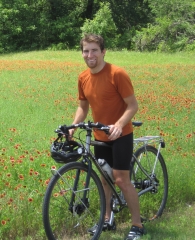


 June
June

